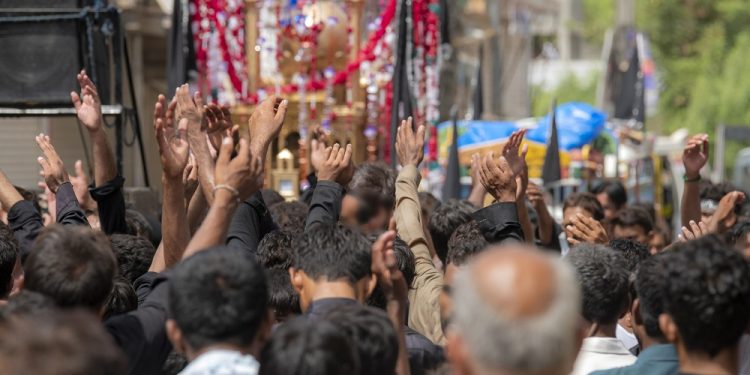
Ashura
Ashura is the tenth day of the first month in the Islamic calendar: Muharram. For the majority of Muslims, this holiday marks the day that the Israelites and Moses were saved from the Pharaoh by God’s intervention in creating a path through the sea. This holiday is a major holy day in Shia Islam, and pilgrimages are held on this day.
For Shia Muslims, Ashura represents the Remembrance of Muharram—the yearly commemoration of the death of Husayn ibn Ali, his family, and supporters at the Battle of Karbala on 10 Muharram 61 AH (about October 10, 680 AD). It’s a day of remembrance for millions of people all over the world to remember Husayn’s stand for social justice.
The Historical Background of Ashura
The Shias were known as the Party of Ali and supported the son-in-law of the Prophet Muhammad, Ali, and the fourth caliph of the Muslim faith. In 661 AD, Ali was murdered, and his chief opponent Muawiya became the caliph. Husayn ibn Ali was the grandson of the Islamic prophet Muhammad.
He contested the fact that Umayyad caliph Muawiya I nominated his son Yazid as his successor prior to his death. Muawiya died in 680, and his son Yazid demanded allegiance from everyone who dissented. Husayn didn’t give him the allegiance that he sought and instead traveled to Mecca. Husayn encountered the people of Kufa, an Iraqi garrison town and the center of Ali’s caliphate.
These people had a long-time attachment to the house of Ali and proposed that Husayn overthrow the Umayyads. On his way to Kufa with about 70 men, the 1,000-man strong army of the caliph intercepted his caravan and forced him to head north. On October 2, he encamped in the plain of Karbala, and a larger Umayyad army consisting of about 4,000 men showed up right after he set up camp.
Umayyad governor Ubayd Allah ibn Ziyad refused Husayn safe passage without submitting first to his authority. When Husayn refused to submit, negotiations quickly broke down between the two sides. On October 10, the Battle of Karbala began, and Husayn was killed along with most of his companions and relatives. All family members of Husayn that survived were immediately taken prisoner.
Immediately after the Battle of Karbala, a period of political and civil war began called the Second Fitna. During this time, two separate campaigns were organized to avenge the death of Husayn. The first campaign was organized by the Tawwabin Uprising, and the second one was organized by Mukhtar al-Thaqafi and his supporters.
Husayn’s death would eventually lead to the split of Islam into two main sects: the Sunnis and the Shias. Today, Shias make up about 15% of the total Muslim population in the world. For all Muslims, the month of Muharram is a month that holds great significance. It’s the holy day on which the prophet Muhammad and his followers fled persecution in Mecca and headed to Medina.
This migration is known as the Hijra. This would come to mark the beginning of the Islamic lunar calendar year: Hijri. This made Muharram the first month of the Islamic year. During this month, Muslims are encouraged to tend to their spiritual self, meditate, fast, give to the poor, and avoid any bad or unlawful behaviors.
Ashura is a day that’s celebrated in different ways by different people. For some Muslims, this day is a day of joy and celebration. For others, it’s a day of mourning, reflection, and sorrow. On this day, Shia Muslims mourn the death of Prophet Muhammad’s grandson Husayn.
Sunni Islam makes up approximately 85% of the total Muslim population in the world. Sunnis believe that Muhammad’s father-in-law, Abu Bakr, should have been the caliph. After all, when the prophet was ill, he assigned Abu Bakr to the role of Imam. However, Shia Muslims believe that the prophet had elected his son-in-law Ali ibn Abi Talib as his successor.
It’s this fundamental disagreement that has fueled the rift between the two sects throughout history to the modern day. Sunni Muslims not only fast on this day but also fast on the day before. This is to follow the example set by the prophet Muhammad. Muhammad had learned of the Jewish practice on this day to thank God for parting the Red Sea for Moses and his people.
Muhammad believed that as a prophet he was more connected to Moses, so he fasted on the 9th and the 10th of Muharram to distinguish them from the Jewish traditions. After Muhammad received the revelation of the Quran, the Islamic calendar was adjusted. The fasting on Ashura became optional, and the fasting during Ramadan became obligatory.
Observations of Ashura Around the World
As mentioned earlier, Sunni Muslims fast on both the 9th and the 10th days of Muharram as a way to observe the example set by the prophet Muhammad. In countries where the Sunni hold the majority, Muslims will observe Ashura with cultural rituals. For example, in Morocco, donations known as zakat are given on the holiday day, and toys for children are bought.
Traditional Moroccan food is cooked, and people sprinkle each other with water. This is based on an ancient Moroccan Jewish ritual that’s based on the belief that water was sacred and promoted prosperity. Children will also go door to door, wearing the new clothes they’ve received, and ask for money, sugar, or nuts. This tradition is known as Hak baba Ashur.
The traditional Moroccan food that’s enjoyed on this day can include organic chicken dishes, dried meats that have been preserved from the meat of the sacrificed lamb slaughtered on Eid Al-Adha, and couscous. If people aren’t generous during Hak baba Ashur, then children will often pelt their homes with rotten eggs or sing derogatory songs about them.
Shia Muslims regard this day as a day of reflection and deep sorrow. It’s a day on which the death of Husayn ibn Ali is mourned. Shia Muslims account for approximately 15% of the Muslim population in the world. On this holiday day, Shia Muslims remember the betrayal of Yazid and mourn the death of Husayn.
They also contemplate the struggle against injustice and tyranny that not only Husayn and his family faced but also what other Muslims face. On Ashura, Shia men and women wear black and parade through the street. This is often accompanied by hitting their chests and crying or chanting. Some Shia men will whip themselves with chains or cut their foreheads until they draw blood.
This is to relive the suffering of Husayn. Recently, some Shia leaders have advocated against this practice because they feel that it might constitute a negative image of Islam. In countries such as Lebanon and Iran, leaders are advising Shia Muslims to instead donate blood on this day.
In Turkey and other areas of the world, Muslims also celebrate this holiday in commemoration of the arrival of Noah’s Ark to Mount Judi (also known as Qardu). It’s believed that God saved the prophet Noah and his companions and family on the tenth day of Muharram. But Muslims aren’t the only people who celebrate Ashura. This holiday is also celebrated by Jews, too.
According to Muslim tradition, when the prophet Muhammad immigrated from Mecca to Medina, he saw many Jews fasting and inquired about the reason for their fast. The Jews replied that it was a special day for them because it’s when God saved Moses and the children of Israel from the evil pharaoh by parting the Red Sea. On the day that God parted the sea, Moses fasted.
In Lebanon and Iraq, the sheikh of the mosque will often retell the story of the Battle of Karbala. This will remind the attendants of the sorrow and the pain that was experienced by Husayn and his family. In Afghanistan, it’s not uncommon for Sunnis to participate in the observances of the Shiite community, or for Shiite takyakhanas to welcome and serve food to Sunnis on this day in an act of solidarity. Many Muslims in the country believe that communal activities such as Ashura can help to unite the Muslim community in the country. Shiites will distribute ab-e-lemon, a special drink made using lemons, basil, and flavored milk.
In Algeria, Ashura is a public holiday and is celebrated as such with the customary traditions associated with this holy day. In Pakistan, Ashura is a public holiday, and most schools and businesses are closed on this day. In all major cities in Pakistan, including Lahore, Islamabad, Quetta, Gilgit, and others, mourning processions are held on this day. Muslims distribute food, milk, water, and soft drinks on this day—a practice that is known as Niaz.
In India, Shiites commemorate this holiday through passion plays known as taziya or ta’ziyeh, ritual scrubbing of their bodies, and self-flagellation. Some Hindus are also known to occasionally take part in these lamentations. These Hindus are known as Mohyals, and they believe that Hindus and Muslims should follow one another’s traditions and rituals. As a result, these Hindus observe Muharram and fast just as Muslims do.
The traditions practiced in Bahrain for Muharram are unique among all of the countries that celebrate this holy month. It’s the only Arab country in the Persian Gulf region that supports a Shia Muslim majority. On Ashura, thousands of Persian Gulf nationals visit Bahrain to participate in religious processions and ceremonies. During the month of Muharram, processions occur almost every single day.
Like other Ashura processions, this usually involves public lamentations, chest-beating, and self-flagellations with chains or knives known as Haidar. Like other countries, passion plays and other reenactments of this day are also performed for the public. In Bahrain, this is a two-day public holiday that occurs on both the 9th and 10th days of Muharram. During this holiday, the Bahraini government also donates food and money for those who observe the Mourning of Muharram.
In Iraq, the practice of Ashura wasn’t allowed by Saddam Hussein, and he was known for arresting and imprisoning those who observed it. Hussein would use his security forces and army to surround Najaf and Karbala for two months to keep people from practicing this holiday. Saddam also prevented clerics from making statements about the Battle of Karbala or referring to the memory of Imam Husayn. This changed after the death of Saddam Hussein when Iraqis could once again celebrate this holiday.
In Iran, the clerics and the government have particular guidelines for observing Ashura. According to the government of Iran, the appropriate ceremony for observing Ashura is one in which people wear black, beat their chests, and head-slap participants in ceremonies that feature a Madah. A Madah is a person who gives a eulogy—in this case, the eulogy of Husayn ibn Ali. Framing Ashura in this way allows the clerics to keep control of the custom, but also allows the government to insert any political messages that they deem appropriate.
It’s also common in Iran for state radio and television to show scenes of anguish, despair, and crying that’s interspersed with songs and poems. During one ceremony known as the Congregation of Hussein’s Infants, mothers take their babies to mourning ceremonies that commemorate the infants that were slain during the battle of Ashura. Although this ceremony started out as something performed by a state-funded religious institution, it has now become a regular ritual among Ashura celebrations among the urban middle class in Iran.
On this day, reenactments of the Battle of Karbala are organized by local communities. However, local clerics are often torn by these celebrations, with some clerics allowing them and others considering them to be heretical. In rural coastal communities, this day is marked by ceremonial bathing in seawater, and in some other towns, rosewater is used to cover people head to toe.








